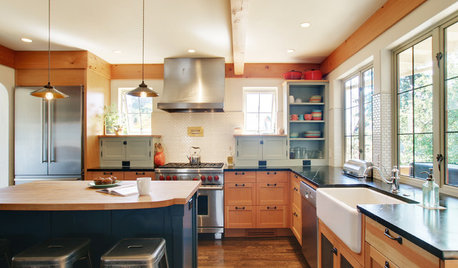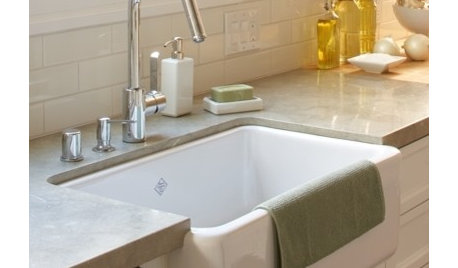question about getting a bid from contractors
sparkleblue75
9 years ago
Featured Answer
Sort by:Oldest
Comments (53)
roof35
9 years agoRelated Discussions
Contractor raised price 50% from original bid
Comments (25)And be careful of the cost plus contracts. No matter how specific you are (we had a 20 page bid sheet, detailing all flooring, windows, walls, trim, paint, built-in's, plumbing, roofing, brick, stone, hand forged iron work) if the builder does not do his job your price just went up, PLUS the % he gets, even though he didn't do HIS job. Our builder did this, couldn't even be bothered to call the supply companies to get our pricing, therefore the house ended up being underbid by $500k!!! Which meant his fees went up quite a bit. It took a long 3 year legal battle to rectify. My best advice would be to have a specific bid sheet, and make him initial & date each item and date and initial the cover page and mark it as the Addendum to the contract. That's where we went wrong, it was difficult to prove that we gave him the spec's when he never initialed them. We won in the end, but what a mess. So make sure that your new builder initials and dates each item to say that "Yes, this price included this". Better yet, do a fixed price but do all your leg work and don't make any changes. That's the only way I would build again....See MoreQuestion about bathroom tile bid
Comments (3)DD2 is doing a MBath remodel. DH did the demolition. Tile guy did the floor and shower floor (Daltile hex and dot), shower walls (Daltile 3x6" tile, shower 4x4x8), shower niche, marble pencil trim in shower x 2, marble tiles on shower curb, built shower curb - concrete since she's on slab, shower pan w/preslope, smooth and level floor, did the waterproof backer board on the shower walls (before tiling). Not doing anything around tub. He brought materials, but not tile. $3200. He's been working in her bathroom for 6 days. Will do the grout tomorrow. Works alone. I don't remember what sf of tile I ordered, but I got 9 boxes of hex and 5 subway. Hardly used any of box #5. 34 pieces of cove base (4 sides of shower bottom)....See MoreContractor Bid Question: Replace ground flashing around home?
Comments (7)Ah ok, that's a lot different than what I was thinking. @3onthetree is probably right about needing to fix the grade; the concrete work in your photos looks to be in rough shape. In the meantime, here are some things to sleuth. You're obviously on a hill. Which side of the basement are you seeing water? You're going to have to track the flow of water around the entire perimeter of the house and make sure it's sloped outwards and downhill. Ie - check those stairs with a spirit level. Are they definitely sloped both away from the house and downhill? Like you mentioned, the concrete gutter at the bottom of the stairs looks like it may have settled to direct water towards the house somewhat. Regarding the flashing: It's not designed to prevent water going into your basement from the ground, but rather to direct runoff from the wall to the steps (which then should direct water away from the house). Check it for holes/cracks. If you don't see any, I don't think that's your main issue. Does your roof have gutters? Do the downspouts direct water to away from the house/downhill?...See MoreContractor bids all over the place?
Comments (17)Princeton is the weirdest town I have ever encountered... If you give a price for remodeling too low, homeowners think it's too low and go for a higher price... If the price is too high neighbors suggest using their contractor who is much cheaper but never shows up or charges an arm and a leg and botch-up the job, some estimate the jobs to get a foot in the door to lock the job and if accepted they don't return calls thinking they bided to low, etc heard many stories like this, especially from contractors that come recommended, or the other way around they're expensive thinking recommendation got the job in the bag but the customer says "wow, that is high". I know many good contractors who don't go into that town to give estimates simply for the reasons I mentioned and all that drama with the homeowner mentality in that town. I myself in all the time in business did only a few jobs there one was an office for a Stock Brokerage firm in the early '90s (I think it's a Jammin Crepes place there now) did a deck remodeling on one of the Estate homes. One job I never forget... I gave a price there on a simple kitchen update, nothing major, small house, direct kitchen replacement, I was @ around 15k, haven't heard anything from the homeowner, did a follow-up and he said they will use a guy who did some work for the neighbor... I live 5min from Princeton, hang out there all the time in the summer, nice college town, lots of good restaurants, etc about 1 year later I ran into a homeowner with the kitchen, he was in the same restaurant (Blue Point Grill I suggest you visit if haven't been there yet) at the table right next to me, and we started talking and he said I wish I hired you because he got screwed royally on that kitchen, the guy who came highly recommended charged him 30k and botched up the job and never returned to make it good on it. That being said, don't go by what websites say PER SF Pricing, they are all misleading. You cannot price any job, especially remodeling job by SF. I know the approximate cost of what I can build a New Home on spec per SF other than that I never base estimates on PerSF bases, every job is different and based on materials-overhead-profit. Especially in Princeton, depending on what area you are in, if you are in the heart of Princeton some places you cannot get dumpsters in, or have to deal with other restrictions so the cost is always up to conduct business there, many trucking company's, excavation companies and even contractors, they hear Princeton and they don't wanna do anything with it unless they can get their numbers. Many surrounding towns have Princeton addresses, like RockyHill, Montgomery, Franklyn, Princeton Junction, etc the remodeling cost in this area is much more reasonable because they have fewer restrictions. As for investing money goes, if you are in actual Princeton Township or Princeton Boro (not sure if they combined the two yet, I know they did that with the police a while back) It's worth investing, you cannot go wrong with that. Everything sells like hotcakes there and very fast as most surrounding places with Princeton addresses ( some people just want to have a Princeton Address even if they live in a different town) :-). Good luck...See MoreCharles Ross Homes
9 years agojellytoast
9 years agolast modified: 9 years agoSombreuil
9 years agojellytoast
9 years agoUser
9 years agoJoseph Corlett, LLC
9 years agoUser
9 years agobry911
9 years agoVertise
9 years agolast modified: 9 years agoUser
9 years agoVertise
9 years agoCharles Ross Homes
9 years agoVertise
9 years agolast modified: 9 years agoCharles Ross Homes
9 years agoVertise
9 years agolast modified: 9 years agojellytoast
9 years agolast modified: 9 years agoJoseph Corlett, LLC
9 years agobry911
9 years agoVertise
9 years agolast modified: 9 years agoCharles Ross Homes
9 years agojewelisfabulous
9 years agobry911
9 years agorwiegand
9 years agobry911
9 years agoVertise
9 years agolast modified: 9 years agoUser
9 years agojellytoast
9 years agobry911
9 years agoArchitectrunnerguy
9 years agolast modified: 9 years agoVertise
9 years agolast modified: 9 years agoUser
9 years agolast modified: 9 years agoVanessafox
9 years agoSue B Hooven
9 years agoUser
9 years agoCabot & Rowe
9 years agoJoseph Corlett, LLC
9 years agoJoseph Corlett, LLC
9 years agoCabot & Rowe
9 years agoJoseph Corlett, LLC
9 years agoweedyacres
9 years agoJoseph Corlett, LLC
9 years agoCharles Ross Homes
9 years agoVanessafox
9 years agoJoseph Corlett, LLC
9 years agoSue B Hooven
9 years agoUser
9 years agolast modified: 9 years agosparkleblue75
8 years ago
Related Stories

BUDGETING YOUR PROJECTConstruction Contracts: What to Know About Estimates vs. Bids
Understanding how contractors bill for services can help you keep costs down and your project on track
Full Story
WORKING WITH PROS10 Questions to Ask Potential Contractors
Ensure the right fit by interviewing general contractors about topics that go beyond the basics
Full Story
MOVINGTips for Winning a Bidding War in a Hot Home Market
Cash isn’t always king in a bidding war. Get the home you want without blowing your budget, using these Realtor-tested strategies
Full Story
WORKING WITH PROS9 Questions to Ask a Home Remodeler Before You Meet
Save time and effort by ruling out deal breakers with your contractor before an in-person session
Full Story
WORKING WITH PROSWhat to Know About Concept Design to Get the Landscape You Want
Learn how landscape architects approach the first phase of design — and how to offer feedback for a better result
Full Story
REMODELING GUIDESContractor Tips: 10 Ways to Get the Remodel You Want for Less
Lighten the load on your remodeling budget without sacrificing your design by heeding this insider advice
Full Story
MOST POPULAR8 Questions to Ask Yourself Before Meeting With Your Designer
Thinking in advance about how you use your space will get your first design consultation off to its best start
Full Story
CONTRACTOR TIPSContractor Tips: Countertop Installation from Start to Finish
From counter templates to ongoing care, a professional contractor shares what you need to know
Full Story
REMODELING GUIDESConsidering a Fixer-Upper? 15 Questions to Ask First
Learn about the hidden costs and treasures of older homes to avoid budget surprises and accidentally tossing valuable features
Full Story
REMODELING GUIDESSurvive Your Home Remodel: 11 Must-Ask Questions
Plan ahead to keep minor hassles from turning into major headaches during an extensive renovation
Full Story






Joseph Corlett, LLC